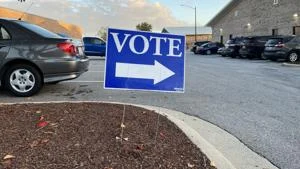(The Center Square) – Georgia early voting requirements can impose financial hardships on smaller towns, a mayor told a state legislative committee Friday.
An estimated 73% of Georgia cities have populations of fewer than 5,000, Rockmart Mayor Sherman Ross told members of the legislature’s Blue Ribbon Committee on Election Procedures.
“We don’t get big turnouts for mayoral elections,” Ross said. “I’ve been involved in two myself. Historically, we have 500 to 550 people come out to vote in a mayor’s race.”
Georgia law requires local governments to have three weeks of early voting, Ross said. In Rockmart, about 50% of voters cast their ballots during early voting, the mayor added.
“We have a civic center here that we use for early voting,” Ross told legislators. “It ties up that facility because we are unable to rent it for other events during that three-week period.”
In addition to the lost rental revenue, it cost the city between $5,000 and $6,000 to hold a municipal election, Ross said.
“I wanted to share that with you guys,” Ross said. “I appreciate you allowing me to take that liberty.”
The legislative committee was created to “study and evaluate Georgia’s current laws, policies and procedures for administering Georgia elections,” according to the state legislative website. It will also “analyze the statewide and local elected officials and boards that oversee the administration of our elections.”
At Friday’s hearing in Rockmart, which has a population of about 4,732, according to the U.S. Census, legislators heard other complaints about current election regulations in Georgia.
State Rep. Saira Draper, a Democrat from Atlanta who serves on the Blue Ribbon Committee, stressed the importance of hearing from local elected officials about the impact of the voting laws passed by the legislature.
“Every change we make in the legislature, we go home in March and our job is done,” she said. “Then it’s up to our 159 counties to enact those changes. So, I’m really happy that we are listening to our county election officials today and receiving their feedback.”
One complaint was about the deadline for requesting an absentee ballot.
Noah Beck, elections director for Polk County, said the county has an annual budget of around $200,000 for elections.
“Two hundred thousand dollars to run a full-scale elections department for 30,000 voters is incredibly lean,” he told legislators. “That’s something that we are incredibly proud of. It’s one of the most fiscally conservative elections department in the state of Georgia per capita.”
His request was simple. Instead of making the deadline for requesting an absentee ballot 11:59 p.m. on the deadline day, which is 11 days before the election, make it 5 p.m. That way, if there are problems with the absentee ballot request, it can be corrected during regular business hours while the elections office is still open.
“If we knew the deadline was at 5 o’clock we could work in real time to fulfill those applications,” he said. “We could stay over – 6 o’clock, seven o’clock to fulfill the application. That’s not a late night for us.”
If absentee ballot requests are received during regular business hours, they can be mailed out to the voter that same day rather than waiting until Monday, lowering the risk of delays by the U.S. Post Office, Beck said.
That would give voters more time to fill out the absentee ballot and return it before election day, Beck added.




